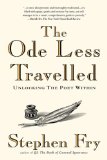“The Ode Less Travelled” by Stephen Fry is a book that attempts to teach you how to write poetry. He introduces the reader to variations of metre, rhyme and form in poetry and tries to dispel the myth that in poetry these days “anything goes”. Even if you never plan to write poetry, this is a good book to read as it illustrates the various techniques and constraints that poets work with and will very likely make you appreciate poetry more. If you do write poetry, or plan to, this is an indispensible book.
The very opening lines of this book are a delight, holding the promise of a very interesting read ahead:
I have a dark and dreadful secret. I write poetry.
The book is written in a charmingly non-condescending and honest tone. The prose sparkles at times with a wit that makes this an enjoyable read. Right at the start the author tells you that you must practise every step of the way in order to benefit from this book. He introduces the three golden rules for making the book work for you, at least two of which apply to reading poetry as well:
- Savour a poem - read it as slowly as possible, re-reading it to feel its rhythm, balance and shape. If you can, read it out loud.
- Don't be afraid - do not worry about “meaning” while reading a poem. Most of the times the meaning will emerge at its own pace.
- Keep a notebook - be ready to write out (not type) a line or a poem as inspiration strikes you or as you play with words and techniques in your free time.
He presents these rules as the “End User Licence Agreement” for reading the book and insists that you agree to them before proceeding with reading the rest of the book.
The book is divided into four chapters dealing with metre, rhyme, form and diction respectively. The one on metre is the longest, which is somewhat understandable as it is the defining characteristic of traditional English verse. (It does get a little tedious at times to be honest though.) This chapter starts off by explaining how the accentuated manner of speaking by native English speakers gives rise to the metre or rhythm of verse. This is especially important to understand for non-native speakers of English whose native languages are unaccented (as is the case for us Indians). The chapter describes all sorts of metre that are found in English verse, providing the technical name (invariably Greek) for each variant and several examples from the poems of famous and not-so-famous poets.
The chapters on rhyme and form similarly show the respective variants using several examples. A nice touch by the author is the liberal use of a poem to describe a variant of rhyme or form that is itself written in that form. The author not only shows examples of good use of poetic techniques, but also several examples of bad use of poetic technique, sometimes by very famous poets like Wordsworth. Poetic forms shown here include not just the ones found in English, but also “exotic” forms like Haiku and Ghazal. Haiku in particular seems to be quite popular as a form for English poems on the Internet, but the author shows how in its native Japanese it does not quite have the commonly-believed 5-7-5 syllabic form and how it is not just about counting syllables.
The last chapter on diction and the current state of poetry is one where taste and talent understandably matter much more than for the ones on metre, rhyme and form. The author tries bravely to explain why the diction in the phrase:
...the sea-shouldering whale.
from Faerie Queene by Edmund Spenser enraptured the young Keats or why:
And Madeline asleep in the lap of legends old.
from The Eve of Saint Agnes by Keats in turn made the author fall in love with poetry. As he admits, it is largely inexplicable how the diction in a sentence or phrase works for some and doesn't for others. I can relate to this feeling as I have sometimes struggled to explain what is so great about:
...I laid my heart open to the benign indifference of the universe.
from The Stranger by Albert Camus, which is from a novel and which retains its power even after translation into English.
The evocative power of diction in poetry, while subject to the restrictions of metre, rhyme and form, is what makes poetry magical for the author (and for me). He particularly derides the “anything goes” style of budding poets these days who don't want to be constrained by metre, rhyme or form and just want to express themselves, irrespective of whether that expression is enjoyable for, or even makes sense to, their readers. He cautions that you need a great mastery of poetry to be able to write effective free verse, without which you just end up with an inglorious mess.
I wish this book were available several decades ago, so that I could read it as a young boy. I wish someone writes similar books for Urdu and Hindi poetry as well (there have been some amazing lines written in Urdu verse in the last 170 years or so). The way poetry was taught and asked about in school nearly killed it for me (and I suspect for many, many other people) and made me skip poems wherever possible. Such a shame. I was thankfully able to overcome this handicap over time, though free verse still makes me gloss over it most of the time.
